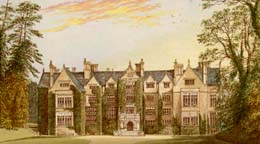Who Asked for the Meeting between Quincy and Lord North?
You may have noticed a conflict in the last two postings about Josiah Quincy, Jr.’s 1774 visit to London.
On 18 November, Quincy toldJonathan Williams John Williams, a Customs officer born in from Boston, that he was willing to meet with government ministers Lord North and Lord Dartmouth but only if they asked: “as it was not at their Lordships’ desire…, I declined going for the present.”
Yet in his diary former governor Thomas Hutchinson wrote that Lord North “let me know Quincy had desired to see him, and that he was determined to allow it.”
So did Quincy seek to converse with Lord North or not? And when on the morning of 19 November Williams, as Quincy wrote, “waited upon me with the Compliments of Lord North, and his request to see me this morning,” had the prime minister made that request? Which man had asked the other’s people for the meeting?
A couple of weeks later Hutchinson noted the contradiction: “Ld. North told me that Quincy desired to be admitted to speak with him. Quincy tells his friends that Ld. North desired to speak with him. It seems Mr. Williams, the Inspector, was the messenger between them.”
Without spelling it out, Hutchinson focused on Williams as the person who’d probably told each man that the other wanted to talk. Williams was part of the British Customs bureaucracy, to be sure; in particular, he appears to have worked closely with Commissioner Corbyn Morris. But Williamswas also a great-nephew of Benjamin Franklin, and he felt loyalty to his home town of Boston. If he could facilitate a solution to the conflict between Massachusetts and the ministry in London, Williams was ready to bend some protocols.
It’s also possible that Lord North changed his mind about being ”determined” to meet Quincy after hearing what Hutchinson had to say about him and was ready to keep the visitor from Massachusetts waiting. In mid-December, Hutchinson heard this story from Israel Mauduit, an unofficial lobbyist for the province and the former governor:
(Another contradiction in the records: Both Hutchinson’s diary and Quincy’s diary recorded a long morning meeting between that man and the prime minister on 19 November. I suspect the date in the Hutchinson book was wrong, and he actually talked with Lord North the previous day. An alternate possibility is that Lord North went from his conversation with Quincy into a discussion between Hutchinson and John Pownall, asked Hutchinson about Quincy, and never let on that he had just met the man.)
TOMORROW: The prime minister and the attorney from Massachusetts.
(The picture above shows Wroxton Abbey in Oxfordshire, Lord North’s country seat. This was not where he met with Hutchinson or Quincy, but it shows the style to which he was accustomed.)
On 18 November, Quincy told
Yet in his diary former governor Thomas Hutchinson wrote that Lord North “let me know Quincy had desired to see him, and that he was determined to allow it.”
So did Quincy seek to converse with Lord North or not? And when on the morning of 19 November Williams, as Quincy wrote, “waited upon me with the Compliments of Lord North, and his request to see me this morning,” had the prime minister made that request? Which man had asked the other’s people for the meeting?
A couple of weeks later Hutchinson noted the contradiction: “Ld. North told me that Quincy desired to be admitted to speak with him. Quincy tells his friends that Ld. North desired to speak with him. It seems Mr. Williams, the Inspector, was the messenger between them.”
Without spelling it out, Hutchinson focused on Williams as the person who’d probably told each man that the other wanted to talk. Williams was part of the British Customs bureaucracy, to be sure; in particular, he appears to have worked closely with Commissioner Corbyn Morris. But Williams
It’s also possible that Lord North changed his mind about being ”determined” to meet Quincy after hearing what Hutchinson had to say about him and was ready to keep the visitor from Massachusetts waiting. In mid-December, Hutchinson heard this story from Israel Mauduit, an unofficial lobbyist for the province and the former governor:
Lord North…said he not send for him [Quincy]. Williams wrote him a letter that such a person was arrived from Boston, and if it would be agreeable, he would bring him to wait on his Lordship. The morning Wms. went himself to Lord North’s, who supposed to be come for an answer. Upon his being admitted, he brought Quincy in with him.However it happened, the meeting was on.
(Another contradiction in the records: Both Hutchinson’s diary and Quincy’s diary recorded a long morning meeting between that man and the prime minister on 19 November. I suspect the date in the Hutchinson book was wrong, and he actually talked with Lord North the previous day. An alternate possibility is that Lord North went from his conversation with Quincy into a discussion between Hutchinson and John Pownall, asked Hutchinson about Quincy, and never let on that he had just met the man.)
TOMORROW: The prime minister and the attorney from Massachusetts.
(The picture above shows Wroxton Abbey in Oxfordshire, Lord North’s country seat. This was not where he met with Hutchinson or Quincy, but it shows the style to which he was accustomed.)


1 comment:
At first I misidentified the Mauduit brother who spoke to Hutchinson not as Israel (1708–1787) but as Jasper (1696–1771). For obvious reasons, Jasper couldn’t have spoken to Hutchinson in late 1774. Thanks to John Tyler for the alert.
Post a Comment